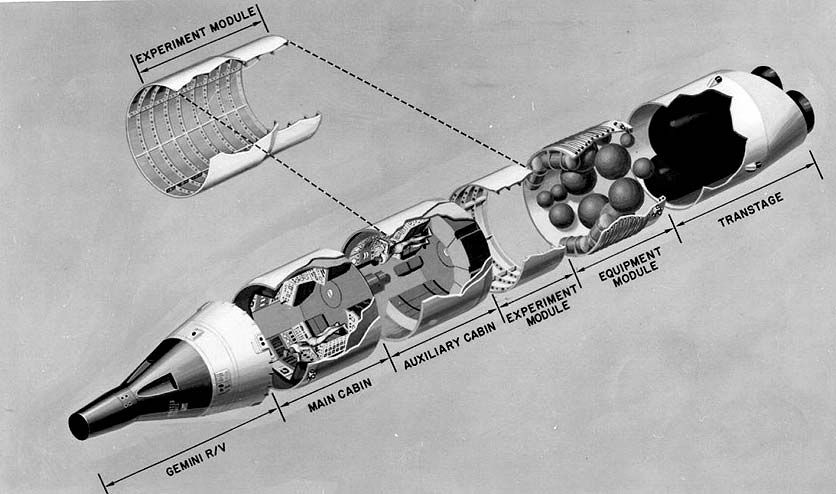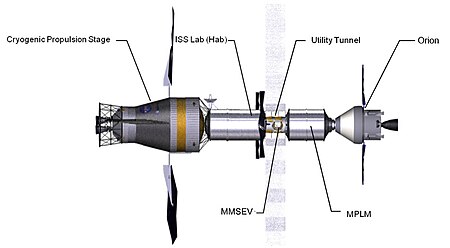Manned Spaceflight - the Next 30 Years
Discussion
I'm sure something along those lines will get built - and possibly within the next twenty years. The Orion module is designed to be used with an attached "habitation section" - a bit like the Laboratory section of the US Air Force's cancelled MOL project. Not quite as grandiose as "Hermes" in "The Martian" but I'm sure it could be enlarged and added to as the ISS was.




It's amazing how important charismatic people with vision are to history - both for good or ill.
It's doubtful if America could have made it to the moon without Von Braun - not just because of his technical input in the design of the Saturn family of rockets, but because of the propaganda campaign for spaceflight he conducted in US magazines, TV, radio and the lecture circuit during the 1950s.
Because he made these efforts, the American public were "prepped" to accept mentally that spaceflight was not something of the distant future, but something that was feasible with the technology being developed at the time.
We need people like Von Braun (without the Nazi/SS background - preferably, of course).
It's doubtful if America could have made it to the moon without Von Braun - not just because of his technical input in the design of the Saturn family of rockets, but because of the propaganda campaign for spaceflight he conducted in US magazines, TV, radio and the lecture circuit during the 1950s.
Because he made these efforts, the American public were "prepped" to accept mentally that spaceflight was not something of the distant future, but something that was feasible with the technology being developed at the time.
We need people like Von Braun (without the Nazi/SS background - preferably, of course).
No - immortality means nothing can kill you (a la Superman - Kryptonite excepted, of course) - so living in the vacuum of space with no food or water would be perfectly feasible. Although the quality of life might be a bit rubbish.
I was being mildly facetious in the sense that a civilisation that possessed massive engineering skills on a solar system or even galactic scale might very well also have developed technology and medical science to the point where they could live forever.
I was being mildly facetious in the sense that a civilisation that possessed massive engineering skills on a solar system or even galactic scale might very well also have developed technology and medical science to the point where they could live forever.
Thanks for the clarification.
Going to Mars or other destinations in the solar system in the next 30 years is nothing to do with saving humanity and I never claimed it was. It's about going places - which humans do.
Please, please, please stop trying to drag this thread into debates about the worth of human spaceflight, Start a thread on that yourself if you want to discuss that topic. This thread, I hoped, would be about the technology and the destinations that WILL be used and aimed for in the next few decades.
Going to Mars or other destinations in the solar system in the next 30 years is nothing to do with saving humanity and I never claimed it was. It's about going places - which humans do.
Please, please, please stop trying to drag this thread into debates about the worth of human spaceflight, Start a thread on that yourself if you want to discuss that topic. This thread, I hoped, would be about the technology and the destinations that WILL be used and aimed for in the next few decades.
Ion drive sounds like one solution. It's already been used a couple of times on small unmanned probes. What are the technical difficulties of using bigger and more powerful ion drive engines for manned missions?
Are there any new technologies that need to be developed to allow this or would it just be a matter of using current technology engines but just making them bigger?
Are there any new technologies that need to be developed to allow this or would it just be a matter of using current technology engines but just making them bigger?
hidetheelephants said:
Eric Mc said:
Ion drive sounds like one solution. It's already been used a couple of times on small unmanned probes. What are the technical difficulties of using bigger and more powerful ion drive engines for manned missions?
Are there any new technologies that need to be developed to allow this or would it just be a matter of using current technology engines but just making them bigger?
Ion drives are slowly being made more efficient but the biggest obstacle is the power source; until a practical fusion reactor or perhaps a compact molten salt fission reactor is built we're stuck with powering ion drives from solar panels, RTGs or powercells, none of which have much power density compared to chemical rockets.Are there any new technologies that need to be developed to allow this or would it just be a matter of using current technology engines but just making them bigger?
I wonder if anyone has seriously done the sums. Why not use the ion drive in what would normally be the "coast" phase? Surely continuous acceleration during that period would shorten the journey time substantially.
And, depending on your destination, you might be able to use some sort of non braking rocket method of deceleration - such as aerobraking.
And, depending on your destination, you might be able to use some sort of non braking rocket method of deceleration - such as aerobraking.
Gassing Station | Science! | Top of Page | What's New | My Stuff




